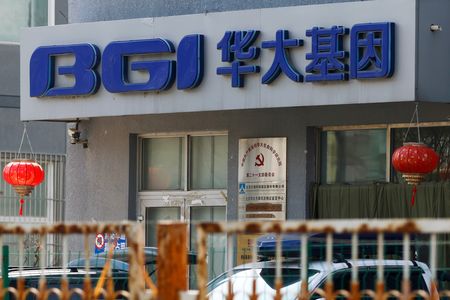By Karen Freifeld and Michael Erman
(Reuters) -The U.S. Senate’s homeland security committee voted on Wednesday to approve a bill that could restrict business with Chinese biotech companies like BGI and WuXi AppTec on national security grounds.
The bill is designed to keep Americans’ personal health and genetic information from foreign adversaries. The bill has spurred deep concern among investors, driving a sell-off in the shares of WuXi AppTec when news of its introduction first reached Chinese markets last month.
Hong Kong shares of Wuxi tumbled as much as 20.6% on Thursday, while the firm’s Shanghai-listed shares opened down the maximum allowed 10%.
While the bill has a long way to go before becoming law, and could change considerably along the way, the vote of approval is a step forward that will likely concern investors who do not want to see the Chinese companies limited in an important market.
WuXi AppTec, for example, generates more than half of its sales from its U.S. business and operates facilities across the country including in Georgia, Pennsylvania and California, as well as a new campus set to open in Delaware.
WuXi and BGI have argued that their names should be stripped from the bill, but the bill that was advanced from committee still named the companies. The bill was, however, amended to exempt preexisting contracts and agreements.
The committee voted 11-1 to move the draft legislation forward.
Once it moves out of committee, the bill must pass in both the full Senate and the House, and then needs be signed by the president. It is not immediately clear when the bill will be brought to the Senate floor for a vote.
Senator Rand Paul, a Republican from Kentucky, was the sole ‘no’ vote and said that senators were “taking advantage of anger towards China to do sort of parochial protectionist things for their particular state.”
He also voiced concerns about the effect the bill could have on the biotech supply chain for U.S. companies.
As currently written, it would prohibit federal agencies from contracting with China’s BGI, MGI, Complete Genomics, WuXi AppTec, their affiliates and other biotechnology companies deemed of concern. It would also stop the government from entering contracts with companies that use their equipment or services.
The companies have denied they pose any security threats.
Wuxi Chairman Ge Li reiterated on Thursday in a Hong Kong stock exchange filing that “we firmly believe that WuXi AppTec has not posed, does not pose, and will not pose a security risk to the United States or any other country.”
The Biotechnology Innovation Organization (BIO), a Washington-based trade association representing biotechnology companies in the U.S. and more than 30 other countries, including WuXi AppTec, had urged the committee to reconsider the legislation.
“Explicitly naming companies for punitive measures establishes a precedent whereby companies can … be punished without necessary and appropriate review,” BIO CEO Rachel King wrote in a letter to Peters, a Democrat, and Paul.
A companion bill introduced in the House in January accuses BGI, a genomics company, of posing a threat to U.S. national security through its collection of genetic data. It describes MGI and Complete Genomics as subsidiaries and affiliates.
WuXi AppTec, which provides R&D and manufacturing services to the pharmaceutical and healthcare industry, allegedly has ties to the Chinese military, according to the House version of the bill.
The companies have said the proposed legislation contains false, misleading and unfounded allegations.
San Jose, Calif.-based Complete Genomics said there is no basis for its inclusion in the bill, which it said will foster a monopoly in the U.S. genomic sequencing instrument market.
WuXi AppTec said in an emailed statement on Wednesday that it does not collect genetic data, and that the bill “relies on misleading allegations and inaccurate assertions to propose preemptive and unjustified prohibitions against our company without due process.”
BGI Group said it does not have access to Americans’ personal data. It said the legislation will drive it out of the U.S. and limit competition.
(Reporting by Karen Freifeld and Michael Erman; Additional reporting by Donny Kwok in Hong Kong; Editing by Stephen Coates, Chizu Nomiyama, Franklin Paul, Deepa Babington and Michael Perry)


